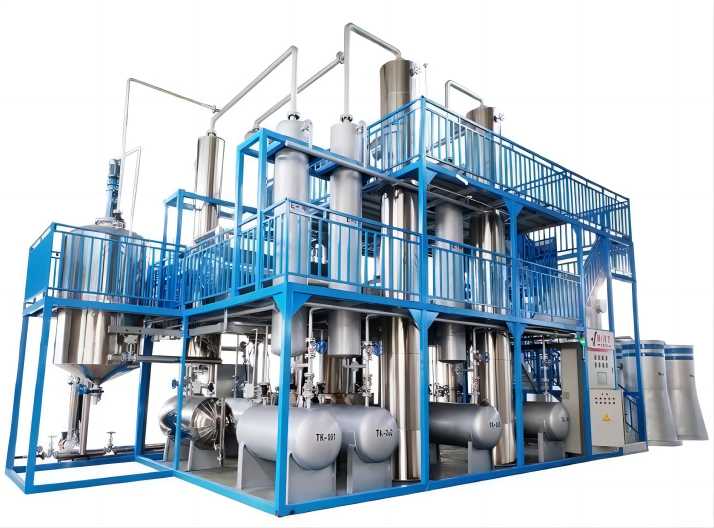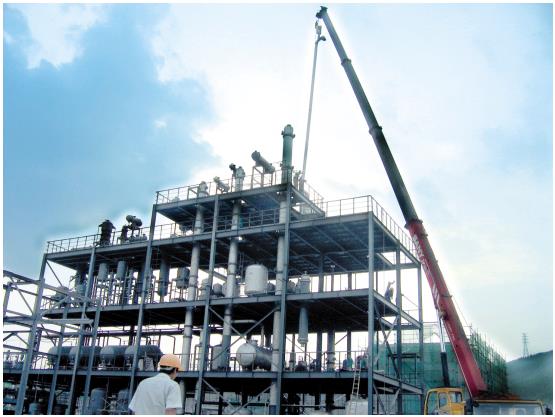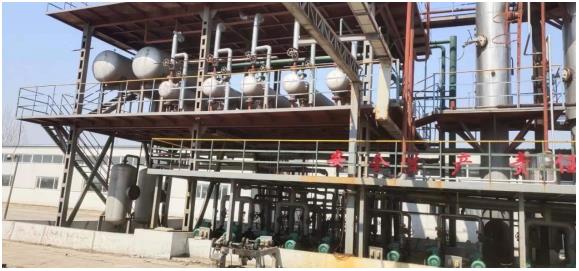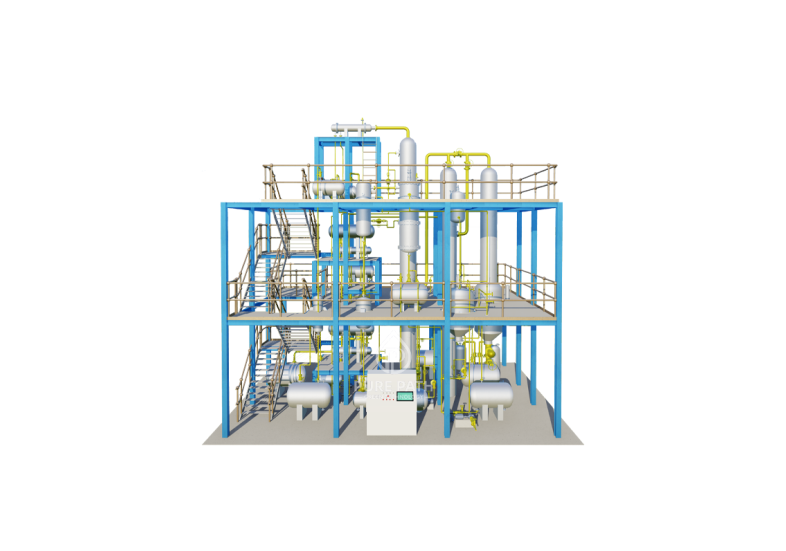Waste Oil Distillation: Turning Trash into Treasure
Waste oil is a growing environmental concern worldwide, with millions of gallons discarded annually. However, rather than being an insurmountable problem, waste oil can be a valuable resource if managed and recycled effectively. Waste oil distillation plants play a pivotal role in this endeavor, transforming discarded oils into valuable end products while promoting sustainability. In this article, we will delve into the end products of waste oil distillation, the types of waste oil that can be distilled, safety features in these plants, and the role of automation.

End Products of Waste Oil Distillation
Waste oil distillation is a process that separates and refines used oils into various valuable end products. Here are the primary end products generated through this process:
Base Oil
- Characteristics: Base oil is a high-quality lubricant with reduced impurities and contaminants compared to raw waste oil.
- Industrial Applications: It serves as a base component for manufacturing various lubricants, such as engine oils, industrial lubricants, and hydraulic fluids.
Diesel Fuel
- Characteristics: The distillation process can convert waste oil into diesel fuel, which is a cleaner-burning alternative to traditional fossil fuels.
- Environmental Benefits: Diesel fuel derived from waste oil distillation reduces the demand for virgin crude oil and lowers greenhouse gas emissions when used in vehicles and machinery.
Asphalt Extender
- Characteristics: Waste oil distillation can produce asphalt extenders, which improve the durability and flexibility of asphalt used in road construction.
- Uses in Road Construction: These extenders enhance the performance of asphalt, making it more resistant to temperature fluctuations and reducing road maintenance costs.
Types of Waste Oil That Can Be Distilled
Waste oil comes in various forms, each with its unique properties and challenges. Waste oil distillation plants are designed to handle a range of waste oil types, including:
Used Motor Oil
- Composition: Used motor oil typically contains contaminants such as heavy metals, sludge, and additives.
- Contaminants: The distillation process effectively removes impurities, producing high-quality base oil or diesel fuel.
Hydraulic Oil
- Characteristics: Hydraulic oils are used in machinery and equipment for transmitting power and lubricating moving parts.
- Sources: Waste hydraulic oil from industries can be distilled, offering a sustainable solution for reusing this critical lubricant.
Transformer Oil
- Properties: Transformer oils insulate and cool electrical transformers, but over time, they can become contaminated.
- Recycling Potential: Distillation can restore transformer oil to its original quality, extending the lifespan of transformers and reducing the need for new oil production.
Industrial Lubricants
- Varieties: Various industrial lubricants, including gear oils and compressor oils, can be recycled through distillation.
- Reusability: Distilling industrial lubricants not only saves resources but also ensures the reliable performance of machinery.

Waste Oil Distillation Plant Safety Features
Safety is paramount in waste oil distillation plants, considering the potential hazards associated with handling flammable materials and complex processes. Here are essential safety features implemented in these facilities:
Fire Prevention
- Flame Arrestors: These devices prevent the propagation of flames and explosions, reducing the risk of fires during the distillation process.
- Fire Suppression Systems: Automated fire suppression systems can quickly detect and extinguish fires to minimize damage and protect workers.
Environmental Protection
- Vapor Recovery Units: These units capture and condense volatile organic compounds (VOCs) emitted during distillation, reducing air pollution.
- Effluent Treatment: Waste oil distillation plants incorporate wastewater treatment systems to manage and treat the effluents generated during the process, preventing environmental contamination.
Worker Safety
- Personal Protective Equipment (PPE): Workers are provided with appropriate PPE, including flame-resistant clothing, helmets, and respiratory protection, to safeguard against potential hazards.
- Training and Education: Ongoing training programs ensure that employees are well-versed in safety protocols, emergency procedures, and the proper use of equipment.
Automation in Waste Oil Distillation Plants
Automation plays a significant role in enhancing the efficiency, safety, and reliability of waste oil distillation processes. Here’s how automation is integrated into these plants:
Process Control
- Automated Temperature and Pressure Regulation: Sensors and controllers maintain optimal distillation conditions, ensuring product quality and consistency.
- Feedback Systems: Automated feedback systems continuously monitor and adjust process parameters to optimize yield and energy efficiency.
Safety Interlocks
- Emergency Shutdown Procedures: Automated emergency shutdown systems can activate instantly in case of critical issues, minimizing risks to personnel and equipment.
- Alarms and Sensors: Automated alarms and sensors alert operators to potential issues, allowing for swift intervention.
Data Monitoring and Analysis
- Remote Monitoring: Automation enables remote monitoring of plant operations, allowing for real-time data analysis and troubleshooting.
- Process Optimization: Data-driven insights help operators fine-tune the distillation process for maximum efficiency and resource utilization.

purepath waste oil distillation
Conclusion
Waste oil distillation plants are essential contributors to sustainable resource management and environmental protection. By converting various types of waste oil into valuable end products like base oil, diesel fuel, and asphalt extenders, these facilities not only reduce waste but also promote cleaner energy sources and safer road construction materials.
Moreover, the incorporation of safety features and automation ensures that waste oil distillation processes are carried out efficiently while safeguarding both workers and the environment. As technology continues to advance, waste oil distillation is poised to play an even more significant role in the circular economy, minimizing waste, conserving resources, and contributing to a greener future.







